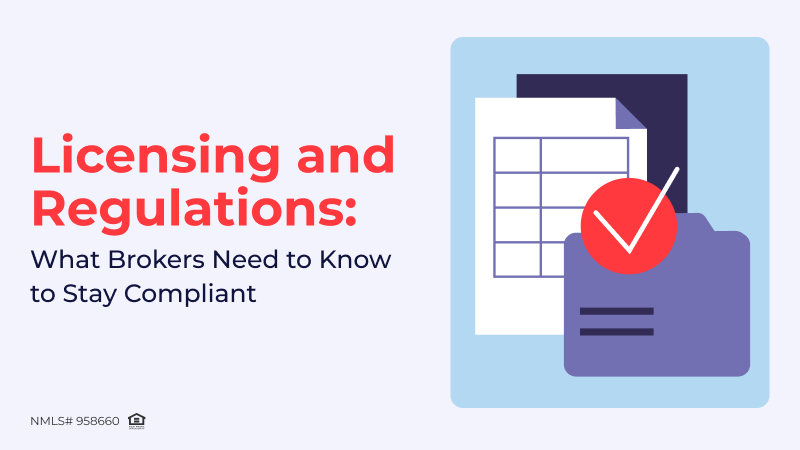Staying compliant with mortgage broker licensing and regulatory requirements is crucial requirement in the industry. Compliance safeguards your business from legal and financial penalties and builds trust with clients and regulatory bodies. This guide will walk you through the essentials of mortgage broker license and regulations, highlighting best practices to ensure you stay compliant.
Understanding Mortgage Broker Licensing
What is a Mortgage Broker License?
Enhanced Broker Portal
that makes your job easier
- All operations at your fingertips
- Easy-to-use intuitive interface
- Integrated AI technology
Show Me How
A mortgage broker license is a certification that allows individuals or companies to act as intermediaries between borrowers and mortgage lenders in the mortgage loan process. This license ensures that brokers meet specific educational, ethical, and professional standards required by law.
State vs. Federal Licensing Requirements
Mortgage broker licensing requirements can vary significantly between states and the federal level. While some states have their own licensing requirements, others follow federal guidelines. It’s essential to understand the specific requirements in your operating state to ensure full compliance.
Steps to Obtain Mortgage Broker Licensing
- Education Requirements. Complete the required pre-licensing education courses, which typically cover topics such as federal and state mortgage laws, ethics, and loan origination processes.
- Pre-Licensing Courses and Exams. Pass the SAFE Mortgage Loan Originator (MLO) Test, which includes both a national and state-specific component.
- Background Checks and Fingerprinting. Undergo a criminal background check and submit fingerprints as part of the application process.
- State-Specific Requirements. Meet any additional requirements imposed by the state, such as additional coursework or fees.
Key Regulatory Bodies and Their Roles
Consumer Financial Protection Bureau (CFPB)
The Consumer Financial Protection Bureau (CFPB) is a federal agency established to oversee and enforce federal consumer financial laws. The CFPB’s primary mission is to protect consumers from unfair, deceptive, or abusive practices in the financial marketplace. For mortgage brokers, the CFPB enforces regulations such as the Real Estate Settlement Procedures Act (RESPA) and the Truth in Lending Act (TILA). The CFPB provides guidance, conducts examinations, and takes enforcement actions against brokers who violate these laws. The bureau also offers resources and tools to help brokers understand and comply with their obligations.
National Mortgage Licensing System (NMLS)
The National Mortgage Licensing System (NMLS) is a centralized platform used by state and federal regulatory agencies to manage the licensing and registration of mortgage brokers and loan originators. NMLS streamlines the mortgage broker licensing process by providing a unified system for submitting applications, paying fees, and tracking license status. Mortgage brokers must use the NMLS to apply for and renew their licenses, ensuring that all required information is up-to-date and accurate. The system also facilitates the sharing of information between state regulators, enhancing oversight and compliance.
State Regulatory Agencies
Each state has its own regulatory agency responsible for overseeing mortgage brokers operating within its jurisdiction. These state agencies enforce state-specific laws and regulations, conduct audits, and handle consumer complaints. For example, in California, the Department of Financial Protection and Innovation (DFPI) regulates mortgage brokers, while in Texas, the Department of Savings and Mortgage Lending (SML) holds this responsibility. State regulatory agencies often impose additional requirements beyond federal regulations, making it essential for brokers to stay informed about local laws and standards.
Federal Housing Finance Agency (FHFA)
The Federal Housing Finance Agency (FHFA) regulates and supervises important aspects of the mortgage industry, including Fannie Mae, Freddie Mac, and the Federal Home Loan Bank System. While FHFA’s primary role is to ensure the safety and soundness of these entities, its oversight impacts mortgage brokers by influencing the standards and practices related to mortgage products and services. The FHFA also plays a role in setting conforming loan limits and guidelines that affect loan origination.
U.S. Department of Housing and Urban Development (HUD)
The U.S. Department of Housing and Urban Development (HUD) plays a crucial role in the mortgage industry through its administration of programs like the Federal Housing Administration (FHA) loans. HUD sets standards for FHA-approved lenders and monitors their compliance with fair lending and housing laws. Mortgage brokers who work with FHA loans must comply with HUD’s guidelines and reporting requirements.
By staying informed about the regulations and guidance issued by regulatory bodies, brokers can ensure they operate within legal boundaries and uphold the highest standards of practice in the mortgage industry.
Core Regulatory Requirements
Struggling with
a loan scenario?
Get a solution in 30 minutes! Fill out
the short form and get your personal offer
Submit a Scenario
Adhering to core regulatory requirements is fundamental for mortgage brokers to ensure compliance and build a trustworthy business. Below, we study key regulations that every mortgage broker must be familiar with.
Real Estate Settlement Procedures Act (RESPA)
The Real Estate Settlement Procedures Act (RESPA) was enacted to protect consumers by ensuring transparency in the real estate settlement process. RESPA mandates that mortgage brokers provide borrowers with timely and accurate disclosures regarding the costs associated with their mortgage transactions. This includes the Good Faith Estimate (GFE), which outlines the estimated costs of the loan, and the HUD-1 Settlement Statement, which provides a detailed account of the actual costs at closing. RESPA also prohibits kickbacks and referral fees that could unnecessarily increase the cost of settlement services.
Truth in Lending Act (TILA)
The Truth in Lending Act (TILA) aims to promote informed use of consumer credit by requiring clear disclosure of key terms and costs associated with loans. Mortgage brokers must ensure borrowers receive a detailed breakdown of the loan’s Annual Percentage Rate (APR), finance charges, amount financed, and total payments. TILA’s regulations are designed to help consumers compare different loan offers and make informed decisions. Additionally, TILA includes the right of rescission, allowing borrowers to cancel certain types of mortgage transactions within three days.
Home Mortgage Disclosure Act (HMDA)
The Home Mortgage Disclosure Act (HMDA) requires financial institutions to collect and report data on their mortgage lending activities. This data is used to monitor compliance with fair lending laws and ensure that institutions are serving the needs of their communities. Mortgage brokers must accurately record information on loan applications, including the race, ethnicity, and gender of applicants, and loan terms and outcomes. This data must be submitted annually to regulatory agencies and is used to identify and address discriminatory lending practices.
Fair Lending Laws (ECOA)
The Equal Credit Opportunity Act (ECOA) is a key fair lending law that prohibits discrimination in any aspect of a credit transaction. Mortgage brokers must ensure that their lending practices are free from discrimination based on race, color, religion, national origin, sex, marital status, age, or receipt of public assistance. Compliance with ECOA involves implementing fair lending policies, providing regular training to employees, and conducting periodic reviews to detect and prevent discriminatory practices. Brokers must also provide applicants with explanations for adverse actions taken on their applications.
Maintaining Compliance: Best Practices for Mortgage Broker Licensing
Regular Training and Education
Ongoing training and education for brokers and staff are crucial to staying compliant. Regularly update your knowledge of federal and state regulations and ensure that all employees are aware of and adhere to these standards.
Implementing Robust Compliance Management Systems
A robust compliance management system (CMS) helps mortgage brokers manage and monitor their compliance obligations. A CMS should include policies and procedures, training programs, internal audits, and regular updates to stay aligned with regulatory changes.
Staying Updated with Regulatory Changes
The mortgage industry is constantly evolving, with new regulations and amendments being introduced regularly. Subscribe to industry newsletters, attend webinars, and participate in professional associations to stay informed about the latest developments.
Conducting Internal Audits and Compliance Checks
Regular internal audits and compliance checks help identify potential issues before they escalate. Review your practices, documentation, and client interactions to ensure they meet all regulatory requirements.
Keeping Accurate and Thorough Documentation
Maintaining detailed records of all transactions, communications, and compliance activities is essential. Proper documentation not only helps in audits but also provides a clear trail of your compliance efforts.
Common Compliance Challenges and How to Overcome Them
Handling Complex Regulatory Environments
Regulatory environment can be challenging to comprehend, especially for brokers operating in multiple states. Use compliance management software and consult with compliance experts to streamline your processes and ensure consistency across different jurisdictions.
Ensuring Consistent Training and Knowledge
Keeping all employees consistently trained and knowledgeable about compliance requirements can be difficult. Implement a structured training program with regular updates and assessments to ensure everyone is on the same page.
Managing Compliance in a Multi-State Practice
For brokers operating in multiple states, staying compliant with varying state regulations is crucial. Use a centralized compliance management system that tracks and updates state-specific requirements, ensuring that your practices are aligned with local laws.
The Role of Technology in Compliance
Compliance software and tools can significantly ease the burden of regulatory compliance. These tools help automate monitoring, reporting, and record-keeping, ensuring that brokers stay compliant with minimal manual effort.
Benefits of Automation in Monitoring and Reporting
Automation helps in real-time monitoring of compliance activities, reducing the risk of human error. Automated systems can generate reports, flag potential issues, and provide insights into your compliance status, allowing for proactive management.
Examples of Popular Compliance Management Systems
Several compliance management systems are popular among mortgage brokers, such as ActiveComply, Comergence, Ncontracts, and RiskExec. These platforms offer features like automated reporting, document management, and real-time compliance tracking, making it easier to stay compliant.
Conclusion
Staying compliant with mortgage broker licensing and regulatory requirements is not just about avoiding penalties. It’s about building a trustworthy and sustainable business. By understanding the key regulations, implementing best practices, and leveraging technology, mortgage brokers can navigate the complex regulatory landscape with confidence. Continuous education and proactive compliance management are the keys to success in this ever-evolving industry.
For more industry insights and updates, subscribe to our blog. Make sure to contact A&D Mortgage to stay ahead of the curve.




